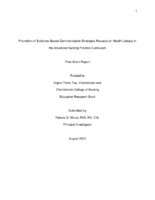Promotion of evidence-based communication strategies focused on health literacy in the advanced nursing practice curriculum
View File(s)
Author Information
- Author(s)
- Details
-
Felecia G. Wood, PhD, RN, CNL, Professor, The University of Alabama Capstone College of Nursing, fwood@ua.edu; Barbara A. Graves, PhD, MSN, RN, Professor, The University of Alabama Capstone College of Nursing, agraves@ua.edu; J. Dean Elmore, PhD, Assistant Professor, Benedictine College jelmore@benedictine.edu
- Sigma Affiliation
- Epsilon Omega
- Contributor Affiliation(s)
- The University of Alabama, Tuscaloosa, Alabama, USA
Visitor Statistics
Visits vs Downloads
Visitors - World Map
Top Visiting Countries
| Country | Visits |
|---|
Top Visiting Cities
| City | Visits |
|---|
Visits (last 6 months)
Downloads (last 6 months)
Popular Works for Wood, Felecia G. by View
| Title | Page Views |
|---|
Popular Works for Wood, Felecia G. by Download
| Title | Downloads |
|---|
View Citations
Citations
The citations below are meant to be used as guidelines. Patrons must make any necessary corrections before using. Pay special attention to personal names, capitalization, and dates. Always consult appropriate citation style resources for the exact formatting and punctuation guidelines.
Item Information
Item Link - Use this link for citations and online mentions.
Abstract
The study was an educational intervention with master’s nursing students to teach health literacy strategies focused on the individual receiving care and the organization in which care was provided. An online module was created; student participants used the teach back strategy, assessed participant self-efficacy relevant to health literacy efforts, implemented creation or revision of a teaching tool, assessed organizational attributes that support health literacy, and completed a self-evaluation of achievement of health literacy competencies. Eighteen master’s nursing students participated; the module was evaluated positively and participants demonstrated improvements in competency achievement, use of active learning strategies, enhanced self-efficacy, and increased awareness of and use of health literacy strategies over the course of one semester.
Repository Posting Date
2020-01-07T16:40:38Z
Notes
The Sigma Theta Tau International grant application that funded this research, in whole or in part, was completed by the applicant and peer-reviewed prior to the award of the Sigma grant. No further peer-review has taken place upon the completion of the Sigma grant final report and its appearance in this repository.
Type Information
| Type | Report |
| Acquisition | Self-submission |
| Review Type | None: Sigma Grant Recipient Report |
| Format | Text-based Document |
Category Information
| Evidence Level | Quasi-Experimental Study, Other |
| Research Approach | Quantitative Research |
| Keywords | Health Literacy; Advanced Nursing Practice; Educational Intervention; Curriculum |
Rights Holder
All rights reserved by the author(s) and/or publisher(s) listed in this item record unless relinquished in whole or part by a rights notation or a Creative Commons License present in this item record.
All permission requests should be directed accordingly and not to the Sigma Repository.
All submitting authors or publishers have affirmed that when using material in their work where they do not own copyright, they have obtained permission of the copyright holder prior to submission and the rights holder has been acknowledged as necessary.
License
The following license files are associated with this item:
Related items
Showing items related by title, author, creator and subjects.
-
Innovative educational strategies to achieve health literacy competencies for advanced practice nurses and interprofessional students
Karl, Joyce I. (2018-06-11)Health literacy (HL) is an important determinant of health status world-wide. In this session the author will share multiple educational strategies, teaching methods/activities, and student outcomes used to help health ... -
Teaching EBP strategies to students in a Doctor of Nursing Practice program
Graves, Barbara Ann; Roussel, Linda Ann; O'Neal, Pamela V.; Polancich, Shea E. (2016-03-21)Session presented on Tuesday, November 10, 2015: This session will focus on teaching evidenced based practice (EBP) strategies to students in a Doctor of Nursing Practice (DNP) program. Selected examples of teaching ... -
Addressing substance abuse using evidence-based practice: Screening, brief intervention, and referral to treatment (SBIRT)
Bremner, Marie N.; Blake, Barbara J.; Maguire, Mary Beth (2017-06-20)Significance: Nurses can have an important role in addressing substance use disorders among healthcare consumers. Approximately 20.8 million people (7.8 percent of the population) met the diagnostic criteria for a substance ... -
Risky behaviors in teenagers, a global issue: Evaluation of an evidence-based intervention to reduce risky behaviors with implications for practice, education and research
Sternas, Kathleen A.; Scharf, Mary Ann; Peterkin, RoseMarie; Summerly, Janet (2012-9-12)Purpose: Teenagers have high rates of risky behavior including drug/alcohol use, smoking, sexual activity which affect health. Risky behaviors are prevalent in the United States, England, Australia, Canada and among Newark ... -
Innovative evidence-based practice education: Battling Dr. Google and Nurse Jackie
Neumeier, Melanie C.; Phillips, Leah Adeline (2016-07-13)Session presented on Saturday, July 23, 2016: In Canada, Registered Nurses (RNs) and Licensed Practical Nurses (LPNs) are required to engage in evidence-based practice (EBP) as an entry to practice competency (CCNRN, 2012, ...






